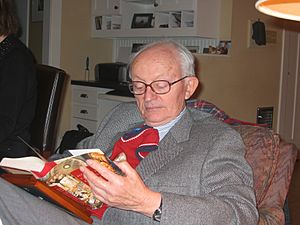Stephen T. Worland facts for kids
Quick facts for kids
Stephen T. Worland
|
|
|---|---|

Stephen T. Worland in 2006
|
|
| Born | February 19, 1923 |
| Died | July 29, 2017 (aged 94) |
| Nationality | American |
| Education | University of Illinois, B.A., Ph.D. |
| Occupation | Economist Professor, University of Notre Dame |
| Spouse(s) | Roberta McCarthy Worland |
| Children | 8 |
Stephen T. Worland (born February 19, 1923 – died July 29, 2017) was an American economics professor. He taught at the University of Notre Dame. Worland was especially interested in the history of economic ideas, how economics affects society (called social economics), and how to make sure everyone has a good life (called welfare economics). He wrote a book called Scholasticism and Welfare Economics in 1967. He also wrote a chapter about economics and fairness in another book.
Contents
About Stephen T. Worland
Worland was born in Neoga, Illinois. He went to public schools there. During World War II, he served in the United States Navy on a big ship called the USS Idaho (BB-42) battleship.
Education and Teaching Career
Worland earned two degrees in Economics from the University of Illinois. He got a Bachelor of Arts (B.A.) and a Ph.D. (a high-level research degree). His Ph.D. paper, finished in 1956, was about the economic ideas of a famous thinker named St. Thomas Aquinas.
Before joining the University of Notre Dame in 1957, Worland taught at Michigan State University and the University of Dayton. He taught at Notre Dame for 30 years. In 1987, he taught for two years at the College of Saint Benedict and Saint John's University. He was the first person to hold a special teaching position there called the Clemens Chair in Economics and the Liberal Arts. He passed away in Columbus, Indiana, in 2017.
Worland's Research and Ideas
Worland's studies and writings often focused on explaining what "economic justice" means. This is the idea of fairness in how money and resources are shared in society. He looked at old ideas from thinkers like Aristotle and connected them to modern economics.
Fairness in Economics
In his book Scholasticism and Welfare Economics, Worland showed that ideas about making society better (welfare economics) are similar to older ways of thinking called scholastic economic reasoning. He helped explain how being efficient in economics connects to the old idea of a "just price" – a fair price for goods.
In a chapter he wrote for the book Justice: Views from the Social Sciences, Worland looked at different economic ideas. These included classical economics, Marxism, and neoclassical economics. He concluded that to have fair sharing of wealth (called distributive justice) in a market society, you need to think about more than just how much people contribute to making things (called production).
Faith and Economics
Worland often focused on Catholic social teaching. This is what the Catholic Church teaches about how society should be fair and just. For example, in his 2001 article Just Wages, he explained the Church's teaching about a living wage. A living wage is enough money for workers to live a decent life.
In a talk he gave in 1994, Worland said that there isn't a special "Christian Economics" or "Catholic Economics." He believed that Christian faith wouldn't create different economic knowledge than what honest scientists could find. However, he also thought that religious messages could help us understand how modern market societies work.
Teaching Philosophy
Worland believed that economics should be taught in a way that helps students understand real-world problems. He wanted them to learn about unfairness and how to help people develop, not just about economic theories and math. In 1975, he wrote that at Notre Dame, where he taught, they decided to change their Ph.D. program. They wanted it to focus on social and economic issues and social justice. He felt that understanding the main problems of society should be important for any economist who truly cares about their job.
Awards and Honors
Worland received special recognition for his work and ideas.
- In 1987, he won the Reinhold Niebuhr Award. This award is given every year to a professor or college leader whose work and life show a strong commitment to social justice.
- In 1993, Worland received the Thomas F. Divine Award. This award is named after one of the people who helped start the Association for Social Economics. It is given each year to a member who has made important contributions to social economics throughout their life.
Selected Publications
Worland wrote several important books and articles.
Books
- Scholasticism and Welfare Economics. Notre Dame, IN: University of Notre Dame Press, 1967.
Articles and Book Chapters
Worland wrote many articles and chapters in books about economics, justice, and how faith connects to these topics. Some of his works explored ideas like:
- How economic justice relates to famous thinkers like Adam Smith.
- The idea of a "just wage" for workers.
- The link between justice and welfare economics.
- The economic social contract.
- Different views on economic justice from various economic schools of thought.
 | Audre Lorde |
 | John Berry Meachum |
 | Ferdinand Lee Barnett |

